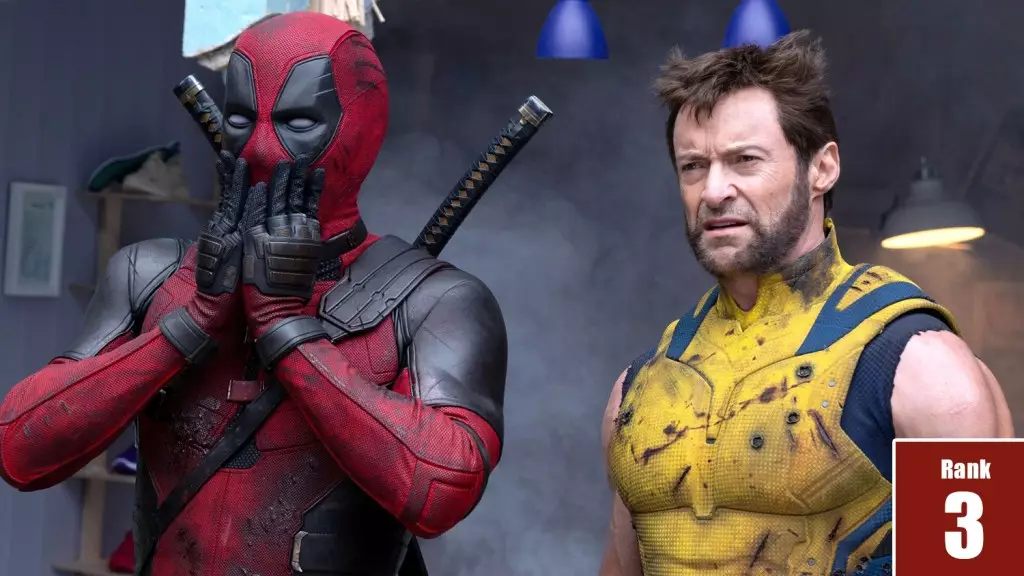The film landscape has seen a remarkable revival in 2024, notably marked by the overwhelming success of *Deadpool & Wolverine*. This latest entry in the Marvel Cinematic Universe (MCU) has re-energized a genre that many critics declared fatigued. With subtle nods to its past and fresh, irreverent humor, this film not only broke box office records but also redefined the superhero genre for a new wave of audiences. By strategically capitalizing on the absence of its characters and innovative marketing, *Deadpool & Wolverine* achieved unprecedented heights, demonstrating that timing and creativity are paramount in Hollywood.
The film’s success is not merely a testament to its entertaining value. Rather, it serves as a critical case study in understanding modern cinema’s evolving economic models. With Disney now managing a significant portion of the Marvel franchise following its acquisition of 20th Century Fox, the cataclysmic shifts in production and marketing strategies are noteworthy. By allowing the titular anti-hero to revel in his outlandish nature, Disney effectively regained its footing in a genre it partially lost control over, capitalizing on nostalgia while keeping the franchise relevant.
The Impact of Marvel’s Marketing Strategy
Marvel’s marketing campaign for *Deadpool & Wolverine* was expertly crafted, incorporating a blend of nostalgia, humor, and a touch of shock value. Featuring a lightning-fast release of trailers, unique in-theatre promotions, and social media buzz, Disney managed to engage both die-hard fans and new viewers alike. The release of its Super Bowl trailer was not only a brilliant marketing move, garnering 365 million views, but it also set the tone for an awaited comeback. Such strategic maneuvers signified Marvel’s readiness to embrace the edgy elements of their storytelling, a shift that fans enthusiastically welcomed.
Furthermore, the film’s premiere was strategically linked to events such as the San Diego Comic-Con (SDCC). By aligning itself with this cultural phenomenon, *Deadpool & Wolverine* captured the essence of the comic book community—a crucial factor in enhancing its visibility. Prominent appearances from the cast, alongside interactive promotional material, added to an aura that turned anticipation into tangible excitement. It’s essential to note how this integration of marketing and fan engagement solidified its position in a competitive market, ultimately leading to astonishing pre-sale records.
Understanding The Box Office Dynamics
Box office performance is not merely about the figures that light up the screens after opening weekends; it encapsulates a broader narrative of audience engagement, cultural relevance, and strategic timing. The sheer profitability of *Deadpool & Wolverine*, which is anticipated to generate over $200 million in its opening weekend alone, illustrates a turning point. Its achievement of surpassing its predecessors’ opening weekends—*Deadpool* and *Deadpool 2*—reveals how a well-crafted and well-timed release can transform perceived genres.
Moreover, the film’s profitability is measured beyond just box office sales. The revenue streams through merchandise, streaming rights, and home video releases are vital components of the financial ecosystem surrounding blockbuster films. For *Deadpool & Wolverine*, the camaraderie between its lead characters—Ryan Reynolds’ buoyant Deadpool and Hugh Jackman’s resurgent Wolverine—draws audiences further into a narrative layered with humor, nostalgia, and modern storytelling twists.
Navigating the Shift from Traditional Releases to Streaming
In a rapidly changing entertainment landscape, the relationship between theatrical releases and streaming platforms is increasingly complex. While traditional studios like Disney, Warner Bros., and others benefit from lucrative deals, modern streamers like Amazon and Apple have also begun to shape the narrative by embracing theatrical releases. Although this year’s analysis for lucrative blockbusters omits these newer platforms, their presence cannot be ignored in the larger discussion of film revenue.
The fluctuating dynamics between box office success and the evolving viewing habits of audiences present a challenge for all studios. As streaming becomes the norm, films like *Deadpool & Wolverine* redefine what it means to be commercially successful. The film serves as a critical touchpoint, raising important conversations about how future blockbusters will navigate this shifting landscape. It showcases that theatrical experience still holds significant weight, especially when combined with compelling storytelling and well-executed marketing strategies.
A New Dawn for the Superhero Genre
Ultimately, *Deadpool & Wolverine* has not only reinforced the comic book genre’s vitality but has also underscored the necessity for innovation in how stories are told and marketed. With unexpected twists, inclusivity of characters, and unabashed humor, it stands as a reminder that films can be both financially successful and culturally relevant. As we proceed further into the landscape of 2024, it is evident that the superhero genre is poised for a renaissance. The success of *Deadpool & Wolverine* not only marks a triumphant return to form for Disney and Marvel but illuminates a path forward—the importance of creativity, engagement, and a deep understanding of audience desires in the world of cinema.

